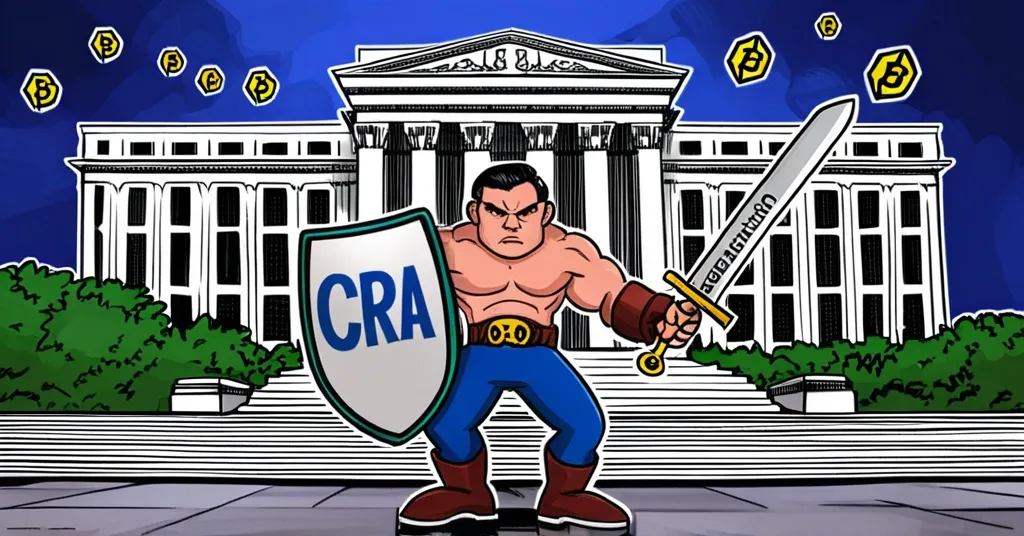Ted Cruz Challenges IRS Crypto Rules with CRA, Sparks Industry Backlash

IRS Crypto Rules Spark Pushback From Texas Senator Ted Cruz
Senator Ted Cruz is gearing up for a showdown with the IRS over controversial crypto income reporting rules, signaling a major battle between government oversight and the burgeoning world of decentralized finance.
- Cruz challenges IRS rule on crypto income reporting using CRA.
- Rule expands ‘broker’ definition, ignoring blockchain’s decentralized nature.
- Crypto community and organizations sue IRS, claiming rule stifles innovation.
The controversy centers around a rule originating from the 2021 infrastructure bill. This rule expands the definition of a ‘broker’ to include entities that facilitate the exchange of digital assets. Essentially, it requires full reporting of crypto income. But, it’s like trying to fit a square peg into a round hole—forcing traditional financial reporting on a system that thrives on its lack of central control. In other words, it doesn’t fit well with how crypto works. Decentralized finance, or DeFi, refers to financial services built on blockchain technology, free from central control, and this rule seems to miss the mark entirely.
In response to these concerns, Senator Cruz, known for his independent stance, is taking decisive action. He’s wielding the Congressional Review Act (CRA) to challenge this rule. The CRA is a legislative tool that allows Congress to review and, with a simple majority, overturn federal regulations within 60 business days of their enactment. It’s a bold move, and one that has garnered support from fellow Republican senators like Cynthia Lummis, Tim Sheehy, and Bill Hagerty, who see this as a stand against government overreach into personal financial freedoms.
But the crypto community isn’t just sitting on the sidelines. Three organizations—the DeFi Education Fund, the Blockchain Association, and the Texas Blockchain Council—have taken the IRS to court over these rules. They argue that the rule stifles innovation and doesn’t respect the decentralized nature of blockchain technology, which operates on a non-centralized structure. As Ron Hammond of the Blockchain Association puts it, “The rule has become politically charged and was a rallying point for many individuals.”
“The rule failed to appreciate the decentralized nature of cryptocurrency and blockchain.” – From the petitioners’ argument against the IRS rule.
So, what’s at stake here? This clash isn’t just about a single rule; it’s a microcosm of the larger tension between the crypto industry and regulatory bodies. The IRS’s attempt to regulate digital assets through traditional means is seen by many as a failure to understand the revolutionary potential of blockchain technology. Sure, some might cheer for more oversight to weed out the scammers, but others fear it could strangle the very innovation that makes crypto so exciting. And let’s face it, we’ve seen our fair share of regulatory overreach in the past, often driven by a lack of understanding of the technology.
As bitcoin maximalists and effective accelerationism (e/acc) advocates, we can’t help but see this as another chapter in the ongoing saga of disruption. While we champion bitcoin’s role in the financial revolution, we also recognize that altcoins and other blockchains, like Ethereum, play crucial roles in niches that bitcoin doesn’t—and perhaps shouldn’t—serve. It’s all about fostering that decentralized, freedom-loving spirit while calling out the bullshit where we see it. Because, let’s be clear, the crypto space has its fair share of both brilliance and BS.
Let’s dive into some key questions and takeaways:
- What is the IRS crypto rule that Senator Cruz is challenging?
The IRS rule requires full reporting of income generated from cryptocurrencies and expands the definition of a ‘broker’ to include entities that do not traditionally fit this role, leading to concerns about its impact on decentralized systems.
- What is the Congressional Review Act (CRA), and how is it being used in this context?
The CRA is a legislative tool that allows Congress to review, and with a simple majority, overturn federal regulations within 60 business days of their enactment. Senator Cruz plans to use the CRA to challenge the IRS rule on crypto income reporting.
- Why is the crypto community opposed to the IRS rule?
The crypto community opposes the IRS rule because it believes the expanded ‘broker’ definition does not reflect the decentralized nature of cryptocurrencies and blockchain technology, potentially stifling innovation and constituting government overreach.
- Who are the key players involved in the lawsuit against the IRS?
The key players involved in the lawsuit are the DeFi Education Fund, the Blockchain Association, and the Texas Blockchain Council.
- What political support does Senator Cruz have for his challenge?
Senator Cruz’s challenge is supported by fellow Republican senators including Cynthia Lummis, Tim Sheehy, and Bill Hagerty.
- How does this challenge reflect broader issues in the crypto industry?
This challenge reflects broader issues in the crypto industry regarding the tension between regulatory oversight and the principles of decentralization and innovation, as well as the political dimension of cryptocurrency regulation.
As this battle unfolds, we’re keeping our eyes on the prize: a future where financial freedom and innovation aren’t just buzzwords, but realities. And remember, while we’re rooting for the good guys, we’re not afraid to call out the nonsense. No bullshit here, just the raw, unfiltered truth about the world of crypto.



